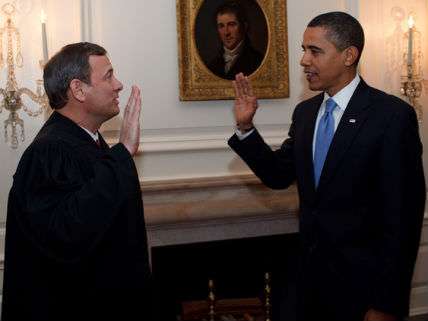5 Supreme Court Cases to Watch in June
The High Court prepares to rule on Obamacare, gay marriage, death penalty drugs, and more.

The Supreme Court's 2014-2015 term will soon reach its finale. By the end of June, when the justices depart for their summer break, the Court is expected to issue a series of blockbuster decisions, including rulings on gay marriage, death penalty drugs, and Obamacare. Here are five cases to watch as another momentous SCOTUS term reaches its peak.
Elonis v. United States
Anthony Elonis claims that he's "just an aspiring rapper" who likes to post violent lyrics and graphic first-person murder fantasies to Facebook. But after numerous Facebook postings in which Elonis wrote about killing his estranged wife, killing his boss, and killing others, including the FBI agent sent to investigate him, a federal jury found him guilty of transmitting "in interstate or foreign commerce any communications containing any threat to kidnap any person or any threat to injure the person of another." He was sentenced to 44 months in prison.
In Elonis v. United States the Supreme Court will decide whether those Facebook posts constituted a "true threat" of violence or whether they count as constitutionally protected speech under the First Amendment.
Glossip v. Gross
The state of Oklahoma employs a three-drug protocol when carrying out the death penalty via lethal injection. The first drug is supposed to render the prisoner totally unconscious and insensate. The second drug is a paralytic. The third drug does the killing. But what if there is a lack of medical consensus about whether or not the first drug actually renders the prisoner unconscious and insensate? What if paralyzed prisoners sometimes suffer excruciating pain in the final minutes before death? Would that lack of medical certainty about the drug's effects violate the Eighth Amendment's prohibition against imposing cruel and unusual punishments?
Glossip v. Gross centers on such concerns. At issue is Oklahoma's use of the drug midazolam to render prisoners unconscious during execution. According to the petitioners, midazolam "is not approved or used as a standalone anesthetic during painful surgeries, because it is inherently incapable of reliably inducing and maintaining deep, comalike unconsciousness." The Supreme Court is tasked with determining whether or not the lower court got it wrong when it allowed Oklahoma to continue using this potentially unreliable drug.
Horne v. United States Department of Agriculture
The Takings Clause of the Fifth Amendment requires the government to pay just compensation when it takes private property for a public use. Yet according to a federal regulation designed to "stabilize" the raisin market, raisin farmers such as Marvin and Laura Horne are required to physically surrender a portion of their crop to federal officials each year without receiving just compensation in return. For example, in 2003-2004, the USDA demanded 30 percent of the annual raisin crop, which amounted to 89,000 tons. In return, the federal government paid nothing back to raisin farmers.
Do the USDA's actions violate the Takings Clause of the Fifth Amendment? The Supreme Court will decide in Horne v. USDA.
Obergefell v. Hodges
Do state legislatures have the lawful power to prohibit gay marriage? Or do state bans on gay marriage violate the 14th Amendment, which forbids the states from denying the equal protection of the laws to any person within their respective jurisdictions? In Obergefell v. Hodges, the Supreme Court confronts the possibility of legalizing gay marriage nationwide.
King v. Burwell
The question before the Supreme Court in King v. Burwell is whether the Obama administration illegally implemented the Patient Protection and Affordable Care Act (ACA) when the IRS allowed tax credits to issue to certain persons who bought health insurance on federally established health care exchanges. According to the text of the ACA, such tax credits should only issue in connection with purchases made via an "Exchange established by the State." According to the Obama administration, however, the phrase "established by the State" is actually a "term of art" that encompasses exchanges established by both the states and by the federal government. The legal challengers, by contrast, maintain that the statutory text is clear and that the health care law means what it says. Depending on how the Court sees it, the long-term survival of Obamacare could be at risk.


Show Comments (32)